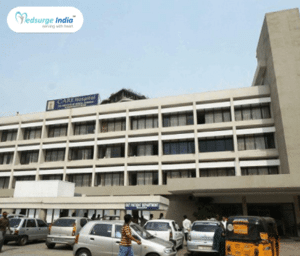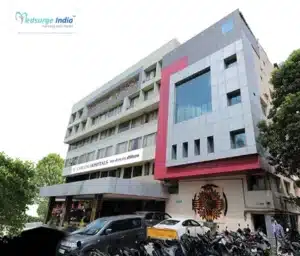Kidney Transplant Cost In India
Unlock Exclusive Discount : Your Gateway to Premium Healthcare with Medsurge India Health Value Card.

Unlock Exclusive Discount : Your Gateway to Premium Healthcare with Medsurge India Health Value Card.


The kidneys are essential for sustaining overall health in the body. They primarily function to filter out waste, maintain electrolyte balance, regulate blood pressure, and produce hormones that encourage the production of red blood cells.
A kidney transplant should be considered when an individual reaches end-stage renal disease (ESRD), a condition where kidney function is severely diminished, posing significant health risks. For those with ESRD who have explored all other treatment avenues, transplantation can lead to enhanced quality of life and increased survival rates. Kidney transplants cost in India are significantly lower compared to many other countries, making it a cost-effective choice for this procedure.
Kidney transplant cost in India starts from ₹5,00,000 to ₹15,00,000 ($6000 to $18,000) or even higher in some cases. The estimate generally includes costs associated with the surgical procedure, hospital admission, immunosuppressive therapy, professional fees for the physician, anesthesia, laboratory examinations, medications, and subsequent follow-up appointments.
| Countries | Prices |
| India | $6000 to $18,000 |
| United State | $200,000 to $400,000 |
| United Kingdom | $49,000 to $56,000 |
| Australia | $50,000 to $100,000 |
| Russia | $40,000 to $70,000 |
| UAE | $28,000 to $35,000 |
Below are the various factors that can affect the cost of Kidney Transplant in India.
Renowned hospital for Kidney Transplant in India offers exceptional medical services and facilities to those patients who seek treatment in India. These facilities rival those of well-known healthcare centers globally. Also, Kidney Transplant cost in India is financially more affordable for foreign patients as they can save up to 40% of the total cost when compared to their native country.
The overall success rate of kidney transplant in India is around 90-95%. One-year post-transplant survival rates for patients typically range from 90-95%, and graft survival rates are about 85-90%. Long-term success rates are also encouraging, with five-year patient survival rates ranging from 70-80% and graft survival rates around 60-70%.
A kidney transplant is a surgical procedure that involves the implantation of a healthy kidney from either a living or deceased donor into an individual with end-stage kidney disease. This procedure is regarded as a treatment option for patients whose kidneys have ceased to function effectively, leading to renal failure. Compared to dialysis, which serves as a temporary measure to filter blood when the kidneys are no longer able to perform this function, kidney transplantation offers substantial benefits. It can enhance the recipient’s quality of life, improve long-term survival rates, and reduce dietary and fluid restrictions associated with dialysis.
Research indicates that individuals who receive kidney transplants tend to have better long-term survival outcomes than those on dialysis. Nonetheless, kidney transplantation is a complex surgical intervention that requires meticulous matching between the donor and recipient, ongoing immunosuppressive medication to prevent organ rejection, and rigorous post-operative monitoring and follow-up care.
Types of Kidney Transplant: There are primarily two categories of kidney transplants.
Individuals experiencing kidney failure, referred to as end-stage renal disease (ESRD), often require a kidney transplant. This procedure is typically considered the most effective treatment option for kidney failure.
Indications for requiring a transplant include:
Here are some ways to save cost during Kidney Transplant in India:
Here are some ways to ease your financial burden during Kidney Transplant in India:
Medsurge India is a distinguished support system for patients in search of doctors, hospitals, and specialized treatments. We are dedicated to identifying the most appropriate medical solutions tailored to your needs. Our team will furnish you with a roster of accredited, esteemed, and reliable doctors and hospitals to address your medical concerns. Furthermore, we present a treatment plan that aligns with your financial constraints. In addition, we extend our support to patients in securing travel permits, medical visas, and various other necessities.
| Estimate Type | Estimated Cost (USD) |
|---|---|
| Total Package Estimate | USD 6,000 – USD 18,000* |
*Final cost depends on hospital, patient condition, and additional procedures/devices if required. Share your reports to get an accurate quote.
Estimated cost range in India: USD 6,000 – USD 18,000*
*For an accurate quote and hospital options, share your reports and preferred city/hospital.
A: Despite the fact that both therapies have benefits and drawbacks, research suggests that patients who have a successful kidney transplant live longer than those who receive dialysis. Furthermore, many transplant recipients report a higher quality of life than those who are on dialysis.
A: Our findings suggested that kidney transplants should be gender-matched. Male donor to female recipient kidney transplants are only successful in extraordinary circumstances, and female donors to male receivers are not recommended, especially in elderly patients with a history of dialysis.
A: You must be in good physical and mental health to donate a kidney. In general, you should be at least 18 years old. Normal kidney function is also required. Some medical issues may make it impossible for you to be a living donor.
A: A 12 out of s12 antigen match is the best match for the recipient. (This is referred to as a “zero mismatch.”) If the patient has a highly common HLA type, all 12 indicators can match even with an unrelated deceased donor organ.
A: By the first 30 days of starting dialysis, recovery rates ranged from 10% to 15%, although nearly half of patients who recovered kidney function did so within 90 days. After 180 days of outpatient chronic dialysis, only a few individuals heal.
A: Dialysis is divided into three categories: in-center hemodialysis, home hemodialysis, and peritoneal dialysis. Each form has advantages and disadvantages. It’s crucial to remember that you can change your dialysis type at any time, so you don’t have to feel “locked-in” to one.

Nephrologist
Consultant
12+ years
Care Hospital, Banjara Hills, Hyderabad
View Doctor
Nephrologist
Clinical Director
34+ years
Care Hospital, Banjara Hills, Hyderabad
View Doctor
Nephrologist
Clinical Director and HOD
17+ years
Care Hospital, Bhubaneswar
View Doctor
Nephrologist
Clinical Director & Senior Consultant
20+ Years
Care Hospital, Banjara Hills, Hyderabad
View Doctor



Nephrologist
Senior Consultant
25+ years of experience
Manipal Hospital, Panaji, North Goa
View Doctor
Nephrologist
Senior Consultant
13+ years of experience
Manipal Hospital, Mandi Mohalla, Mysore
View Doctor
Nephrologist
Consultant
34+ years of experience
KMC Hospital, Hampankatta, Mangaluru
View Doctor









By using our site, you agree to our Terms and Conditions, Privacy Policy and Refund Policy. Medsurge India provides reliable healthcare information and treatment options to support informed decision-making. Our content is designed to support and complement the guidance of your treating doctor, helping you feel informed and confident throughout your healthcare journey. We also Accept International Payments.

Copyright © 2025 NSM ONLINE SOLUTIONS PRIVATE LIMITED. All rights reserved.